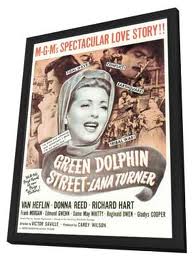
GREEN DOLPHIN STREET
US, 1947, 141 minutes, Black and white.
Lana Turner, Donna Reed, Van Heflin, Richard Hart, Edmund Gwenn, Dame May Whitty, Frank Morgan, Reginald Owen.
Directed by Victor Saville.
A very popular entertainment of the mid-40s, it was the equivalent of the later all-star lengthy blockbuster. Directed by Victor Saville, more noted for being a producer than a director (making at this time The Green Years and If Winter Comes), the film was very entertaining and involving.
Focussing on the history of two sisters and mistaken letters leading to an unhappy marriage and the other sister going to a convent, the film had plenty of romance and adventure. Set in France, the action moves to Hong Kong and finally to a spectacular New Zealand. Lana Turner was at home in this kind of role as the turbulent sister. Donna Reed was sweet and attractive as the good sister. Edmund Gwenn and Dame May Whitty, amongst others, are very effective in the supporting cast. The hero is the sturdy Van Heflin. Memorable are the earthquake sequences set in New Zealand and these are amongst the best of their kind. Popular entertainment, strong characterisations, action and good character studies, as well as plenty of themes in popular form.
1. How entertaining a film? Its impact now? A big-budget film of the 1940s, the characteristics of its style?
2. The quality of black and white photography, the stars, musical background? The sets and the re-creation of Saint Pierre, New Zealand, China? The special effects, the island and the earthquake? In comparison with film-making now?
3. Comment on the vast scope of the film. Comment on Its structure and the picturing of the generations. The comparison of the generations, the experience of the two families? How did this scope engage audience interest?
4. The background of Saint Pierre? France in the 19th century, the domination of the monastery physically, and morally? Life on the island and an isolated community? Their attitudes towards the sea and its opening to the world? The aristocracy and the ordinary classes on the island? The houses of the two families across the street? The symbolism of the way of life of the two families: the Ozannes and the Patourels? The nature of their interaction? Comment on the quality of life. The importance of this background for the interaction during the film?
5. The significance of the stories before the film opened? The deathbed truth? Sophie and her love for Edmund? Her growing in love for her husband? His knowledge of the truth? As indicating a theme of love and growing in love, as illustrated in the next generation? How true were these relationships, and how well explored? Comment on each of the characters of this generation.
6. The transition then into the lives of William, Marianne, and Marguerite? How was the truth of the previous experience illustrated In these three? The meaning of life, relationships and love? The interrelating of Ti and his experience in Saint Pierre's violence, his going to sea, and his entering into the lives of these three people in New Zealand? The meaning of fate, chance?
7. Comment on Marianne and Marguerite. The picturing of them together, their similarities as sisters, their differences in character, their love? What were the strengths and weaknesses of each sister? How were these developed during the film?
8. How idiotic was the mistake by William? How meaningless did it seem? And yet the wide-reaching effect?
9. Marianne and her wilfulness? Her determination to go, to have William? Her courage to make the voyage? Her marriage and her work in pioneering? Her love for William, her attitude towards Ti? The birth of Veronica and its impact? Making a new home In New Zealand? The impact of the earthquake, learning through experience, wealth and access? The importance of
her social life in Dunedin? The revelation in her return? The impact of her being hurt and having to cope? Strength of character through this crisis? What insight into the character of a strong and determined woman?
10. The contrast with Marguerite? The attractive and gentle sister? Her being hurt, her losing all possibilities of love? Tier staying, at home, her learning to adapt? Her life in the convent? The Mother Superior as knowing Sophie's experience and Marguerite's? Her true vocation and her remaining at the end?
11. What insight into the character of William? A weak man, devoted to his father, yet like his father? His mistake? Not revealing the truth? His working hard, making a life, changing? His renunciation of Marguerite? Making a future with Marianne?
12. The contrast with Ti? His melodramatic introduction into the film? His work in New Zealand? His love for Marianne and his control of this love? His helping William and Marianne? The revelation of the truth and its effect on the couple?
13. Comment on the film's detailed look at colonial life, pioneering in New Zealand, the lumber industry, the earthquake, the atmosphere of the Maori wars, an adventurous impact to the human relationships, successful social life In New Zealand?
14. What did the atmosphere of the sea, distances, travel and communication in the 19th century have in the film? The important role of Captain O'Hara?
15. The quality of the film as presenting human issues, historical values?